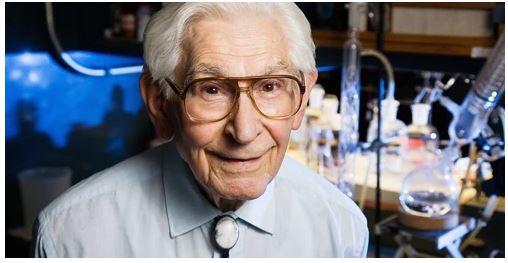
The 100-year-old scientist who pushed the FDA to ban artificial trans fat
[NOTE: June 16, 2015 – FDA gives manufacturers 3 years to remove artificial trans fat from the nation’s food supply]……
No one was more pleased by the Food and Drug Administration’s decision Tuesday to eliminate artificial trans fats from the U.S. food supply than Fred Kummerow, a 100-year-old University of Illinois professor who has warned about the dangers of the artery-clogging substance for nearly six decades.
“Science won out,” Kummerow, who sued the FDA in 2013 for not acting sooner, said in an interview from his home in Illinois. “It’s very important that we don’t have this in our diet.”
In the 1950s, as a young university researcher, Kummerow convinced a local hospital to let him examine the arteries of people who had died from heart disease. He made a jarring discovery. The tissue contained high levels of artificial trans fat, a substance that had been discovered decades earlier but had become ubiquitous in processed foods throughout the country.
Later, he conducted a study showing that rats developed atherosclerosis after being fed artificial trans fats. When he removed the substance from their diets, the atherosclerosis disappeared from their arteries.
Kummerow first published his research warning about the dangers of artery-clogging trans fats in 1957. More than a decade later, while serving on a subcommittee of the American Heart Association, he detailed the massive amounts of trans fat in the shortening and margarines lining grocery shelves, and helped convince the food industry to lower the content in certain products.
Despite Kummerow’s research and warnings over the years, artificial trans fats remained a staple of processed food for decades. Well into the 1980s, many scientists and public health advocates believed that partially hydrogenated oils were preferable to more natural saturated fats. And the food industry was reluctant to do away with artificial trans fats, which were cheaper than their natural counterparts, extended shelf life and gave foods desirable taste and texture.
“The industry was very much for trans fat,” said Kummerow, noting that each time a group formed to study the issue over the years, it seemed to turn out the same way. “It always ended up that you had to have more research before you could come to a conclusion.”
Frustrated by the lack of action, Kummerow filed a 3,000-word citizen petition with the FDA in 2009, citing the mounting body of evidence against trans fat. The first line read: “I request to ban partially hydrogenated fat from the American diet.”
By that time, he certainly wasn’t alone.
In the 1990s, more and more studies had shown that trans fats were a key culprit in the rising rates of heart disease. The advocacy group Center for Science in the Public Interest also petitioned the FDA in 1994 to require that the substance be listed on nutrition labels — a move that the agency put into place in 2006. In 2002, the Institute of Medicine found that there was “no safe level of trans fatty acids and people should eat as little of them as possible.” As the dangers of trans fat became clearer, public opinion also shifted, and food companies increasingly removed the substance from products, though it remained in a broad range of foods, from cake frostings to baked goods.
Four years after filing his petition and hearing nothing, Kummerow sued the FDA and the Department of Health and Human Services in 2013, with the help of a California law firm. The suit asked a judge to compel the agency to respond to Kummerow’s petition and “to ban partially hydrogenated oils unless a complete administrative review finds new evidence for their safety.”
Three months later, the FDA announced its plans to effectively eliminate trans fats by saying that the substance no longer would be assumed safe for use in human foods. Tuesday’s action finalizes that initial proposal, and manufacturers will have three years to reformulate products or to petition the agency for an exception.
Glad as he was to see the government finally eliminate most trans fat from the food supply — a move he thinks will save thousands of lives — Kummerow doesn’t consider his job done. He’s pressing forward on research about how fried fats can affect metabolism, hoping to add more academic journal articles to his long list of publications.
As for his own diet, Kummerow said he doesn’t spend much time worrying about cholesterol, which he doesn’t believe is a central culprit in heart disease (he even wrote a book on the topic). He drinks whole milk and eats eggs. But he does steer clear of fried foods, margarine and anything associated with partially-hydrogenated oils.
Kummerow recalled how last fall, at his 100th birthday celebration, someone brought a ready-made cake to the party. When he studied the label, he quickly noticed that it contained trans fat.
“I threw it out,” he joked. “There were a lot of other things [to eat].”
You must be logged in to post a comment.